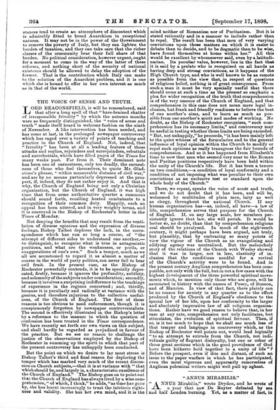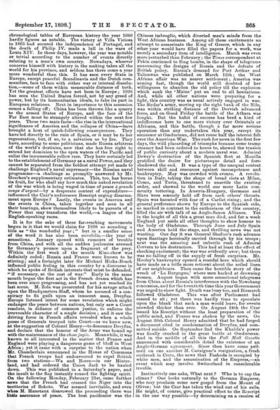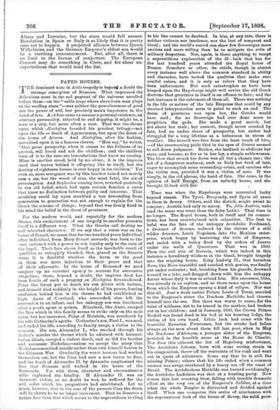" ANNUS MIRABILIS." "A NNUS Mirabilis," wrote Dryden, and he wrote
of a year that saw De Ruyter defeated by sea. and half London burning. Yet, as a matter of fact, in chronological tables of European history the year 1666 hardly figures as notable. The victory at Villa Viciosa in 1665 had secured the independence of Portugal, and the death of Philip IV. made a lull in the wars of Louis XIV. In those days, however, the year was notable or trivial according to the number of events directly relating to a man's own country. Nowadays, whoever concerns himself with history in the making takes all the world for his province, and seldom has there come a year more wonderful than this. It has seen every State in Europe, except peaceful Scandinavia and the Dutch com- munities, face to face with either war or internal dissolu- tion,—some of them within measurable distance of both. Yet the greatest effects have not been in Europe ; 1898 has seen the United States forced, not by any greed of power, but by its humanitarian ideals, to take its part in European relations. Next in importance to this accession comes a falling off; China has been thrown like a quarry to the armed States of Europe, and the face of the Far East must be strangely altered within the next few years. These two main facts—the rise in the international significance of America and the collapse of China—have brought a host of quick-following consequences. They have led directly to the ruin of Spain, or it may be to her regeneration, but, if so, to a salvation as by fire. They have, according to some politicians, made Russia arbitress of the world's destinies, now that she has free right to extend her dominion to the open waters of the Pacific and enlist the innumerable yellow race. They have certainly led to the establishment of Germany as a naval Power, and they cannot be separated from the boldest attempt yet made to challenge England's naval supremacy—the Russian naval programme—a challenge so promptly answered by Mr. Goschen's supplementary estimates. This, too, has borne its fruit, for who shall Bay how much this naked revelation of the war which is being waged in time of peace a grands coups d'argent—by a desperate contest of expenditure— influenced the Czar's unforeseen Rescript urging disarma- ment upon Europe ? Lastly, the events in America and the events in China, taken together and seen in all their bearings, show themselves likely to be parents of a Power that may transform the world,—a league of the English-speaking races.
It is for the sake of these far-reaching movements begun in it that we would claim for 1898 so sounding a title as "the wonderful year ; " but in a smaller sense of the word it has also been mirabilisa—the year of sensations. January opened with rumours of trouble from China, and with all the sudden jealousies aroused by Germany's pounce upon a fragment of the prey. Within the first week of the month Kiao-chow was definitely ceded ; Russia and France were known to be stirring; and a fortnight later Sir Michael Hicks-Beach inflamed public feeling in this country by a discourse in which he spoke of British interests that must be defended, "if necessary, at the cost of war." Early in the same month began the first act in the French drama which has been ever since progressing, and has not yet reached its last scene. M. Zola was prosecuted for his savage attack upon the Headquarters Staff, whom he accused of a con- spiracy to fix guilt upon an innocent man, Dreyfus. Europe listened intent for some revelation which might endanger the peace between nations, but only saw a Court resolute, in defiance of common justice, to enforce the irrevocable character of a single decision ; and it saw the driving force in French affairs revealed when a whole posse of Generals trooped into Court—as we know now, at the suggestion of Colonel Henry—to denounce Dreyfus, and declare that. the honour of the Army was bound up with the maintenance of the chose jugee. Meanwhile, it was known to all interested in the matter that France and England were playing a dangerous game of bluff in West Africa ; yet it came with a surprise to the nation when Mr. Chamberlain announced in the House of Commons that French troops had endeavoured to expel British from two stations—Wa and Borea—in our Hinter- land, and had ordered the Union Jack to be hauled down. This was published in a Saturday's paper, and the insult to the flag instantly roused the fighting spirit. On the following Monday, February 21st, came further news that the French had crossed the Niger into the territories of Sokoto. War seemed inevitable, and even when M. Hanotaux disavowed the proceeding there was little assurance of peace. The beat pacificator was the Chinese imbroglio, which diverted men's minds from the West African business. Among all these excitements an attempt to assassinate the King of Greece, which in any other year would have filled the papers for a week, was merely a secondary item of intelligence. March was even more perturbed than February ; the Times correspondent at Pekin continued to fling bombs, in the shape of telegrams announcing the designs of Russia and the defeats of British policy. Russia's demand for Port Arthur and Talienwan was published on March 12th; the West African affair was no nearer settlement ; America was arming fast, though the world still doubted of her willingness to abandon the old policy till the explosion which sunk the 'Maine' put an end to all hesitations. And, while all other nations were preparing for a. fight, this country was as usual actively engaged in war. The Sirdar's army, moving up the right bank of the Nile, was within striking distance of the Dervish advanced force, and on Good Friday the battle of the Atbara was fought. But the habit of success has bred a kind of indifference here to one more victory over Orientals or Africans, and this battle, though a far more serious operation than any undertaken this year, except its successor at Omdurman, did not rouse half the interest felt over the American War. The rush for news in the first few days, the wild placarding of triumphs because some tramp steamer had been ordered to heave to, showed the tension of public curiosity about a modern naval war. Admiral Dewey's destruction of the Spanish fleet at Manilla gratified the desire for picturesque detail and fore- shadowed the end. It was a type of the unequal contest between skill and resources against incompetence and, bankruptcy. May was crowded with events. A revolu- tion in Italy, taking the shape of bread riots at Milan,. Como, and Turin, threatened to unsettle the existing order, and showed to the world one more Latin com- munity tottering. In Austria-Hungary, Germans and Slays were scarcely held off from each others' throats. Spain was haunted with fear of a Carlist rising ; and the general preference shown by Europe to the Spanish side, so marked in contrast to the enthusiasm of this country, filled the air with talk of an Anglo-Saxon Alliance. Yet in the height of all this a great man died, and for a week England put aside all other thoughts to show honour ba the body of Gladstone. Through June and July Spain and America held the stage, and thrilling news was not wanting. One day it was General Shafter's rash advance upon Santiago heroically carried through by his troops ; next was the amazing and imbecile rush of Admiral Cervera to his destruction. This had at least the effect of checking excitement; the war was evidently over; but there was no falling off in the supply of fresh surprises. Mr. Hooley's bankruptcy opened a scandal here which should have made us a trifle more reticent about the soiled linen of our neighbours. Then came the horrible story of the wreck of La Burgogne,' where men hacked at drowning women. August began with more sensational telegrams from China about Russia's interference with the Newchang concession, and for the twentieth time this year Government was urged to show fight. Death was busy too, and Bismarck followed Gladstone. This was after Parliament had ceased to sit ; yet there was hardly time to speculate- upon the blank that such a man would leave, for events, crowded thicker than ever. On August 24th the Czar issued his Rescript without the least preparation of the public mind, and France was shaken by the news. On August 30th Colonel Henry admitted that be had forged a document cited in condemnation of Dreyfus, and com- mitted suicide. On September 2nd the Khalifa's power was finally crushed in the great battle at Omdurman. And in the middle of all this the Pall Mall Gazette announced with considerable detail the existence of an Anglo-German agreement. Since then have come pell- mell on one another M. Cavaignac's resignation, a fresh outbreak in Crete, the news that Fashoda is occupied by white men, and the assassination of the Empress,—an event which may involve Switzerland in considerable trouble.
Instinctively one asks, What next ? Who is to cap the climax ? One looks naturally to the German Emperor, who may proclaim some new gospel from the Mount of Olives ; but the Czar has taken the wind out of his sails, He might, of course, give practical effect to the Rescript in the one way possible—by determining on a cession of
Alsace and Lorraine, but the stars would fall sooner. Revolution in Spain or Italy is so likely that it is pretty sure not to happen. A projected alliance between Queen Wilhelmina and the German Emperor's eldest son would be a startling announcement. But, after all, there is no limit to the license of conjecture. The European Concert may do something in Crete, and for sheer un- expectedness that would head the list.




































 Previous page
Previous page